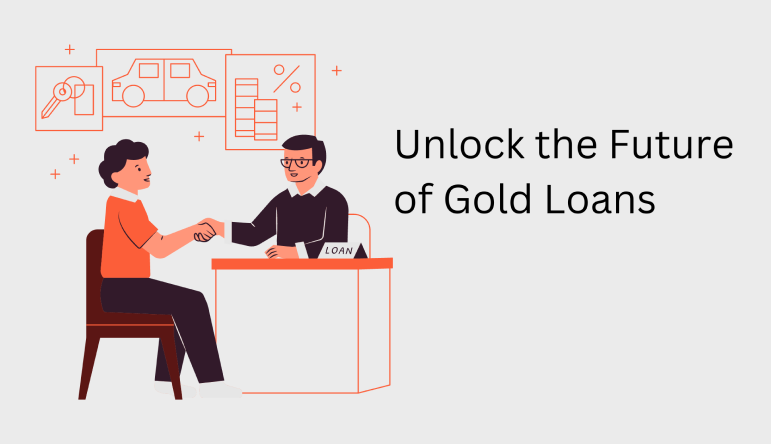Gold Loan vs Personal Loan – Which Is Better and Why?
09 November, 2025 Gold Loan
5 mins read
When you’re in urgent need of funds, you’re often left with two practical financing choices: a gold loan or a personal loan. But which one is better for you? The answer isn’t as simple as one-size-fits-all it depends on your needs, assets, and financial goals.
In this blog, we’ll break down the difference between gold loans and personal loans, covering everything from interest rates, tenure, eligibility, and default risk, so you can make an informed decision.
What Is a Gold Loan vs a Personal Loan?
A gold loan is a secured loan where you pledge your gold ornaments or coins as collateral to get a loan. The amount you can borrow depends on the value and purity of the gold. On the other hand, a personal loan is unsecured—no collateral is needed. Banks and NBFCs lend money based on your credit history, income, and repayment capacity.
While a gold loan gives you quick access to funds without heavy paperwork, a personal loan offers greater flexibility but comes with stricter eligibility requirements.
Interest Rates: Is a Gold Loan Interest Rate Lower Than a Personal Loan?
One of the biggest deciding factors is the interest rate. Typically, gold loan interest rates are lower than personal loan rates because the lender has a physical asset (your gold) as security.
- Gold Loan Interest Rate (2025): Usually ranges between 8% – 12%
- Personal Loan Interest Rate (2025): Typically falls between 12% – 24%, depending on your credit profile
If your priority is cost-effective borrowing, a gold loan may be cheaper than a personal loan.
Tenure & Repayment: Gold Loan Tenure vs Personal Loan Tenure
A gold loan is ideal for short-term needs. Most lenders offer repayment periods ranging from 3 months to 3 years. Some even allow bullet repayment (lump sum) or interest-only EMI options.
In contrast, a personal loan is suitable for longer tenures, usually between 1 to 5 years. This allows borrowers to spread out repayments through EMIs, which can ease monthly financial stress.
So, if you need money for a short duration and plan to repay it quickly, a gold loan is better than a personal loan in that case.
Eligibility Criteria: Personal Loan vs Gold Loan Requirements
Gold Loan Eligibility:
- Age 18–65
- Ownership of gold (18k to 24k purity)
- Minimal documentation (ID proof, address proof)
- No income proof required
Personal Loan Eligibility:
- Good CIBIL score (usually 700+)
- Steady monthly income
- Minimum work experience (for salaried applicants)
- Detailed income documents and KYC
Clearly, personal loan eligibility is stricter than gold loan eligibility, making gold loans a better option for individuals with poor credit history or irregular income.
Default Risk and Regulatory Concerns: Gold Loan Risk vs Personal Loan Risk
One major concern with gold loans is the risk of default—if you fail to repay, the lender can auction your pledged gold. Moreover, the RBI has recently warned about rising gold loan default risks and valuation malpractice in certain NBFCs.
On the other hand, personal loans, while unsecured, affect your credit score if you default. This can make future borrowing more expensive or even impossible.
In summary:
- Gold Loan Risk: Asset seizure risk, but no CIBIL impact if unpaid
- Personal Loan Risk: No asset seizure, but strong CIBIL impact
When to Choose Gold Loan vs Personal Loan?
| Scenario | Recommended Option |
|---|---|
|
Need instant funds without credit check |
Gold Loan |
|
Have valuable gold assets at home |
Gold Loan |
|
Want to build or improve credit score |
Personal Loan |
|
Need long repayment period with fixed EMIs |
Personal Loan |
|
No gold available to pledge |
Personal Loan |
|
Want to avoid risking personal assets |
Personal Loan |
Credit Score Impact: Personal Loan Helps You Build Credit
A personal loan can help you build or improve your credit score if repaid on time. Timely EMI payments are reported to credit bureaus like CIBIL, which improves your creditworthiness for future borrowing.
In contrast, gold loans usually don’t impact your credit score, positively or negatively—unless there’s a legal issue after a default.
Real Cost Comparison: Gold Loan vs Personal Loan
Let’s compare the two with a simplified matrix:
|
Feature |
Gold Loan |
Personal Loan |
|---|---|---|
|
Interest Rate (%) |
8–12% |
12–24% |
|
Loan Tenure |
3–36 months |
12–60 months |
|
Collateral Requirement |
Yes (gold ornaments) |
No |
|
Processing Time |
1–2 hours |
1–3 working days |
|
Credit Score Impact |
Neutral |
Positive (if repaid) |
|
Eligibility |
Minimal |
Strict (income, credit score required) |
|
Risk Factor |
Asset seizure |
Credit score damage |
Frequently Asked Questions (FAQs)
1. Is gold loan better than personal loan for bad credit?
Yes. If you have a low credit score or no credit history, gold loan is better because it doesn’t require a credit check.
2. Can I repay my gold loan early without penalty?
Many lenders offer zero or minimal prepayment charges for gold loans. Always check the specific lender’s policy.
3. What happens if I can’t repay my gold loan?
If you default, your pledged gold can be auctioned. However, this won’t typically affect your CIBIL score.
4. Which loan is safer—gold loan or personal loan?
Personal loans are safer in terms of asset security but pose a higher credit risk. Gold loans carry the risk of losing your pledged gold.
Conclusion: So, Which Is Better—Gold Loan or Personal Loan?
Both loan types serve different needs. A gold loan is ideal if you need quick cash, have gold assets, and want to avoid complicated credit checks. A personal loan is better if you prefer a longer repayment period, want to build your credit score, or don’t have gold to pledge.
Your decision should depend on your financial urgency, repayment capacity, and available resources. Choose wisely—and compare offers before borrowing!





















